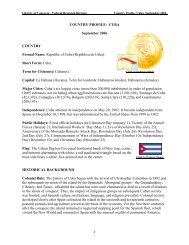1 - American Memory
1 - American Memory
1 - American Memory
Create successful ePaper yourself
Turn your PDF publications into a flip-book with our unique Google optimized e-Paper software.
12<br />
25 days from today—is the expiration date of present longshore con-<br />
tracts on the west coast as well as in Hawaii.<br />
Thank you, Mr. Chairman.<br />
[Senator Fong's prepared statement follows:]<br />
STATEMENT OF HON. HIBAM L. FONO, A U.S. SENATOR FBOM THE STATE OF HAW An<br />
Mr. Chairman and Members of the Subcommittee:<br />
Before I begin my statement in support of H.R, 7189, The Hawaii and Western<br />
Islands Surface Commerce Protection Act of 1973, may I commend you for<br />
scheduling this hearing on legislation which is of crucial importance to the 859,-<br />
000 people of my State of Hawaii. I also wish to express my appreciation for your<br />
courtesy in inviting me to appear before you today. I am sure 1 speak for all the<br />
people of Hawaii in expressing gratitude for your interest and concern.<br />
I strongly support H.R. 7189, whicli was introduced by Representatives Mat-<br />
sunaga and Minlc of Hawaii and Mr. Won Pat, the Delegate from Guam. My<br />
colleague from Hawaii, Senator Inouye, and I have introduced a substantially<br />
similar bill in the Senate, S. 1566, the Hawaii and United States Pacific Islands<br />
Surface Commerce Act of 1973, on which a hearing will be held tomorrow, June 6,<br />
by the Merchant Marine Subcommittee of the Senate Commerce Committee.<br />
The preparation and introduction of this legislation represents a sustained,<br />
intensive, and unified effort by all four members of the Hawaii Congressional<br />
Delegation. I am convinced, on the basis of many conversations, letters, and other<br />
communications, that the overwhelming majority of the people in Hawaii also<br />
strongly support this bill. I can also report that it has the endorsement of many<br />
other concerned individuals and businesses in other parts of the nation.<br />
Under the provisions of H.R. 7189, a 160-day exemption from any West Coast<br />
longshore or maritime strike or lockout is provided for Hawaii and the other<br />
Pacitic Islands under U.S. jurisdiction—Guam, <strong>American</strong> Samoa and the Trust<br />
Territory of the Pacific Islands. Together with the 80-day Taft-Hartley back-to-<br />
work injunction that would probably be obtained at some point during such a<br />
lengthy work stoppage, our ocean lifeline could be kept open for a total of 240<br />
day.s.<br />
.Justification for this legislation rests upon three basic facts. First, Hawaii is an<br />
island State in the Pacific Ocean, nearly 2.500 miles distant from the U.S. Main-<br />
land. Second, its geographical location makes Hawaii primarily dependent upon<br />
a single mode of transportation—ocean shipping—for the movement of the almost<br />
all imports and exix>rt8 essential to sustain our people and economy. Third,<br />
Hawaii's dependence on ocean shipping renders the entire State extremely vul-<br />
nerable to disruptions of maritime commerce.<br />
An estimated 99 per cent of the total freight tonnage between Hawaii and the<br />
U.S. Mainland is normally carried by ship. The remaining one per cent moves<br />
by air carrier, except when shipping is interrupted and air cargo l)ecomes the<br />
only alternative.<br />
In that event, air capacity can be increased to between 2 and 214 per cent of<br />
the normal freight tonnage—but Hawaii must forego the remaining 9< per cent,<br />
for there is literally no other alternative means of transportation—no train.';,<br />
no Interstate trucks, no buses, no automobiles, nor any other mode of transpor-<br />
tation between Hawaii and the U.S. Alainland.<br />
Approximately 80 per cent of all physical commodities purchased by Hawaii's<br />
859,000 people are imported, primarily from the U.S. .Mainland and principally<br />
from the West Coast. Xo industry or individual is free from dependence upon im-<br />
ported goods.<br />
Whether a resident of Hawaii buys a car or a typewriter, a bag of rice or a<br />
piece of plywood. In order to reach the point of retail sale his purchase first<br />
had to be transported over thousands of miles of ocean.<br />
Virtually everywhere one looks, therefore, the goods and supplies essential to<br />
modern living in Hawaii are imported or Import-dependent. Cement and con-<br />
crete products used In construction, for example, are produced In Hawaii—but<br />
two essential Ingredients, silica sand and gypsum rock—must be brought In from<br />
the U.S. Mainland. To give another instance, locally produced meat and dairy<br />
products must ultimately deiwnd upon the availability of imported livestock<br />
feed.



![Albert Einstein Papers [finding aid]. Library of Congress. [PDF ...](https://img.yumpu.com/21604228/1/190x245/albert-einstein-papers-finding-aid-library-of-congress-pdf-.jpg?quality=85)





![American Colony in Jerusalem Collection [finding aid]. Library of ...](https://img.yumpu.com/17941275/1/190x245/american-colony-in-jerusalem-collection-finding-aid-library-of-.jpg?quality=85)



![Piccard Family Papers [finding aid]. - American Memory - Library of ...](https://img.yumpu.com/17941234/1/190x245/piccard-family-papers-finding-aid-american-memory-library-of-.jpg?quality=85)


